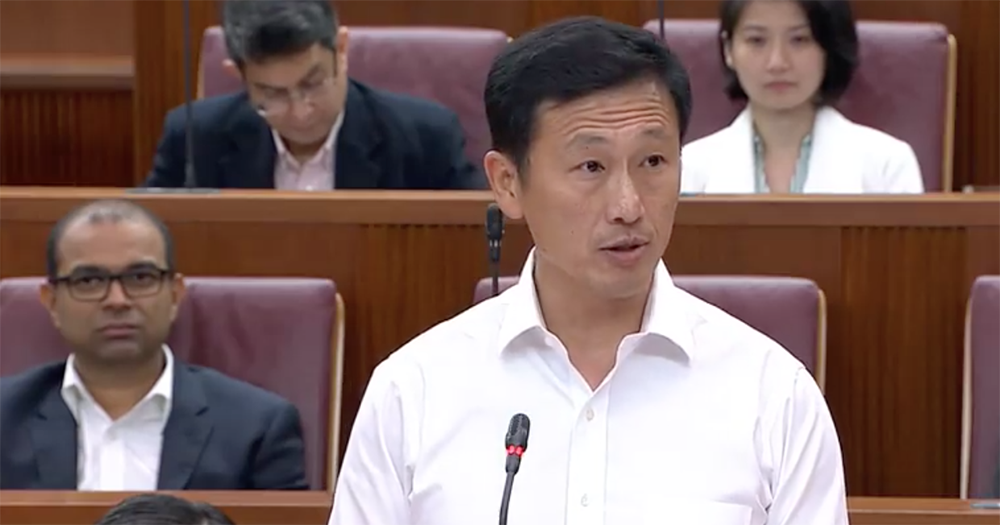The Protection from Online Falsehoods and Manipulation Bill (POFMA) will not diminish, but enhance public discourse.
This was the thrust of Minister for Education Ong Ye Kung's speech in Parliament on May 8, aimed at addressing concerns by academics that the Bill would impact political discourse in Singapore.
Does not impact academic research
Ong clarified that it was impossible for the Bill to be applied to academic research as it had nothing to do with such an area.
Ong's speech had been made in response to a letter signed by 124 academics voicing their concern about the Bill.
Breaking down the make-up of the academics, Ong said that 71 were foreign academics based in foreign universities, and 52 of them were Singaporeans.
25 of which were based in foreign universities, while 27 were based in local universities.
Three gates must be passed through for POFMA to be applied
In defining how a falsehood would be subjected by POFMA, Ong highlighted that the statement must pass through three gates.
These are:
- Putting up an online statement of fact that is false.
- The statement must cause public harm.
Once these first two gates are crossed, the falsehood may be corrected or removed, under a Direction order.
As for the third gate, Ong stated that this was the gate of criminal liability, in which the propagator of the falsehood must have knowledge that it is false and harmful.
Gates unlikely to be crossed
Ong distinguished between two kinds of academic research -- empirical-based research and research that is based on opinion, philosophy, interpretation of history, cultural bias and geographical context.
In the case of empirical-based academic research, such research would already fail to cross the first gate by virtue of being based on real data and observations to draw conclusions.
Moreover, even if the data was not accurate because the experiment was not well conducted, or the data collected was not reproducible, there would be no falsehood as defined by POFMA.
As for the second kind of research, Ong added that it could not be subjected to the law, even if they are controversial or offensive to some.
Ong clarified that this was because hypotheses, theories, and opinions are not covered by the Bill, as the Bill is about the truthfulness of "facts".
POFMA only applies if false data or observations were made
Ong stated that the only instance in which POFMA could apply is when the research uses false observations and data to start with, which prevents the public discourse from taking place properly.
Ong acknowledged however, that in such cases, this kind of work would not even pass the professional standards of any decent university or research institute.
The law treats all academics and activists equally
Ong further stated that the real concern of academics was that POFMA will be abused and used to stifle political discourse in Singapore.
Here, Ong pointed out that while some researchers could also be activists, it was important to not conflate research with activism.
Said Ong:
"Let me put it quite plainly. Any activist will not be caught by POFMA if you express an opinion or hurl criticisms at the Government. The law treats all activists equally - whether you are an academic or a man or woman on the street.
It does not target academics. You are as free as an ordinary citizen to comment on current affairs and critique the Government."
Equal treatment, both ways
Ong stated that this conversely also meant any activist – academic or not – who uses the online medium to spread falsehoods that harm society, will not be spared under the law either.
Additionally, the law will not offer any special shield to academics either.
Ong added that while academics could put out an opinion on, for example, how Singapore’s education system is elitist and does more harm to the poor than good, they should expect government agencies to present counter-arguments.
To this, Ong struck a humorous note, stating,"If that has a chilling effect, please chill", to laughter from the House.
Fake news is a serious problem
Ong reiterated that fake news was still a serious problem however, given the rate at which it could spread.
Speaking in Chinese, Ong noted that fake news often spreads more quickly than the truth.
Citing research by MIT on social media, Ong stated they found fake news could spread to 20,000 people in one day, and the truth would only reach 10,000 people in three days, or six times faster.
This was what the Bill targeted, according to Ong, deliberate lies and incitement of unrest.
Ong added that this made the Bill an enhancement to democratic public discourse.
"We want this interaction and exchange of ideas and opinions to be free of malicious falsehoods which poison the atmosphere and mislead the discourse."
Top image screenshot from CNA
If you like what you read, follow us on Facebook, Instagram, Twitter and Telegram to get the latest updates.
